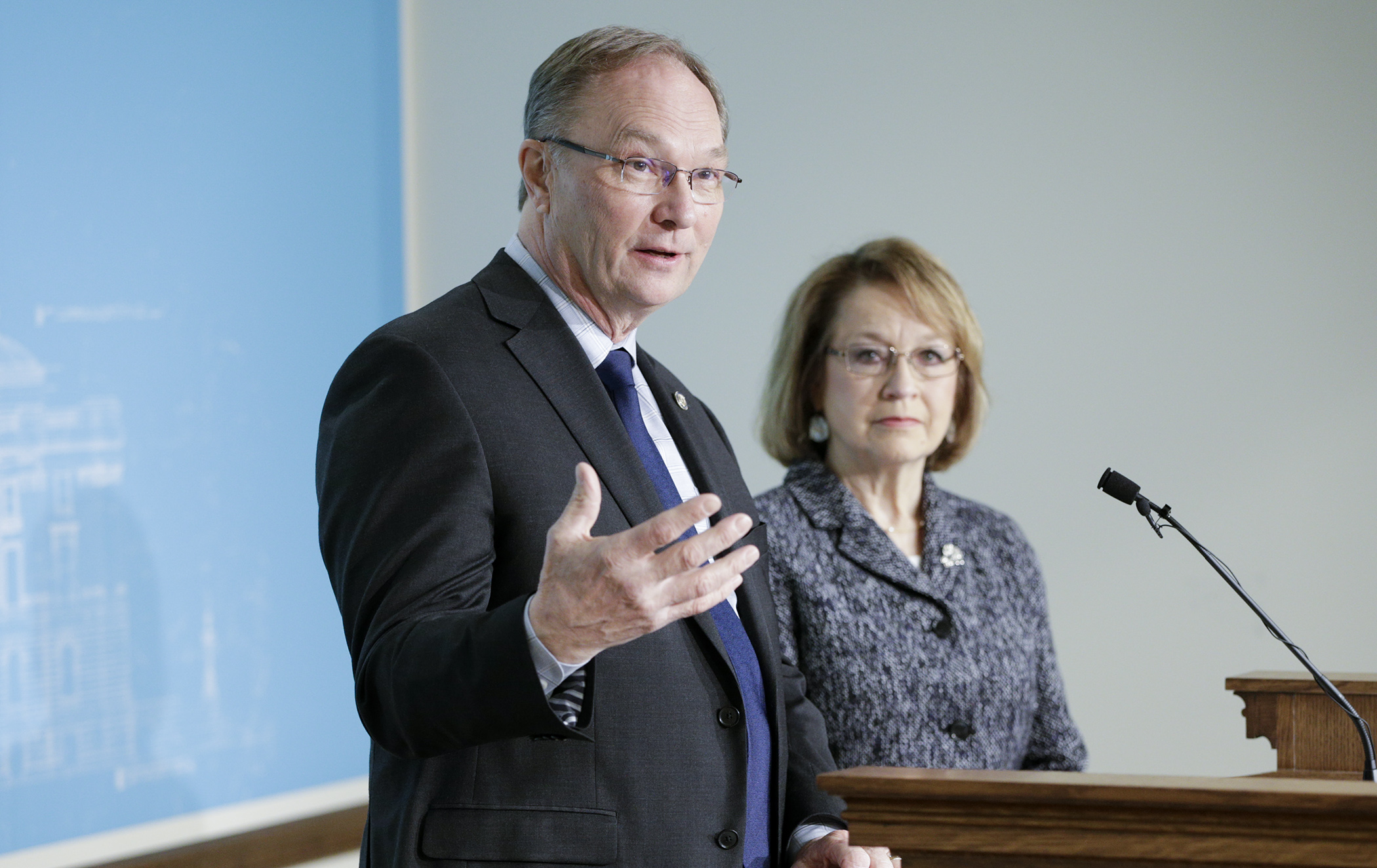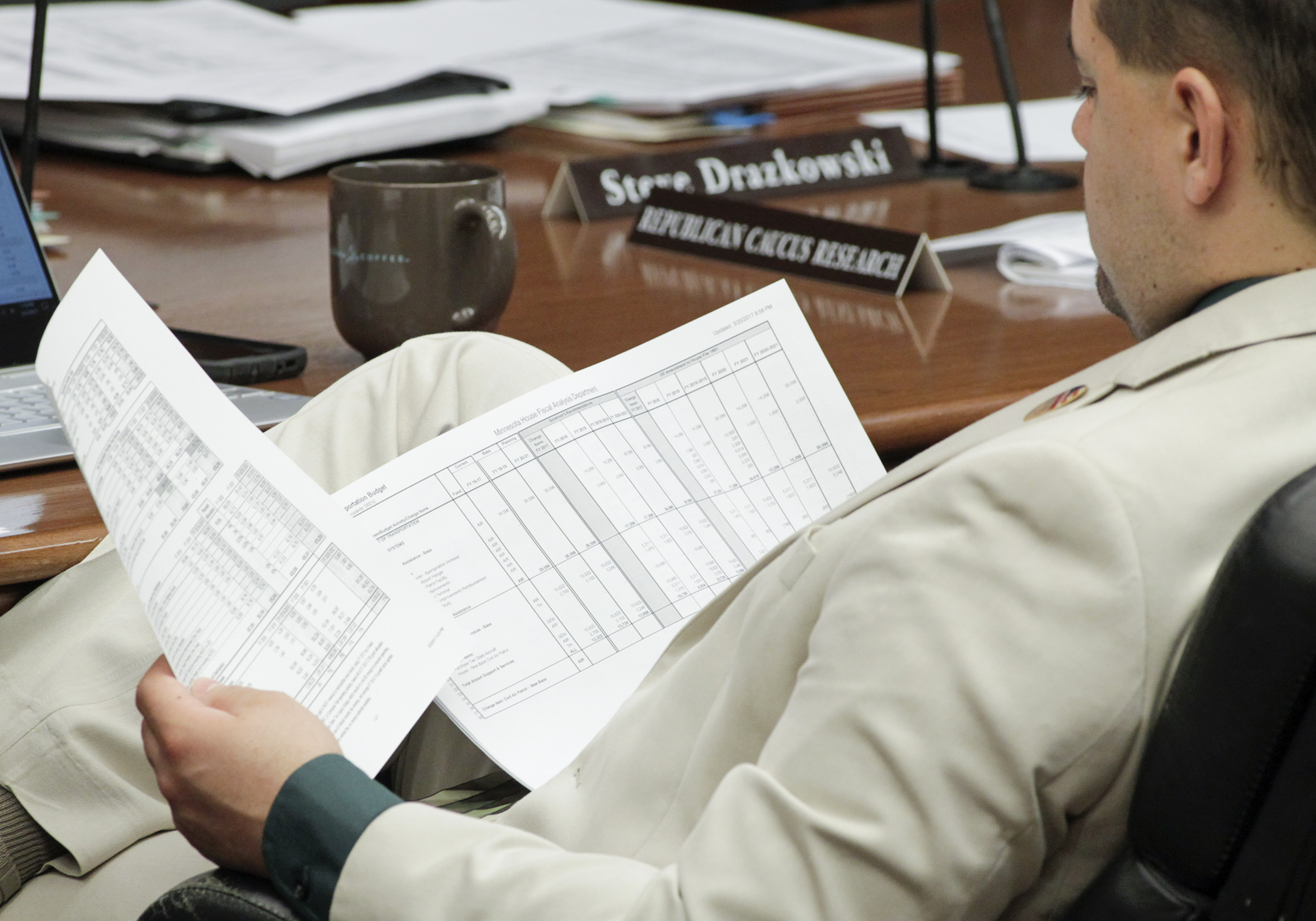House GOP lays out $6 billion map for road and bridge construction

House Republicans on Tuesday unveiled an omnibus transportation bill that would lean heavily on General Fund dollars and borrowing to pour roughly $2 billion into road and bridge projects across the state over the next two years.
Christened the “Road and Bridge Act,” the plan would shift $450 million in transportation-related tax revenues from the General Fund into a new account for road and bridge infrastructure projects. It also proposes $1 billion in Trunk Highway borrowing over four years and would institute a $75 annual surcharge on electric vehicles.
In all, the plan would raise an additional $6 billion in road and bridge funding over 10 years.
“I believe transportation is one of the fundamental areas government is expected to fund and I have no problem making that a priority within the General Fund,” said Rep. Paul Torkelson (R-Hanska), chair of the House Transportation Finance Committee, during Tuesday’s news conference.
Existing revenues that would be shifted from the General Fund into a new “Transportation Priorities Fund” in the 2018-19 biennium are:
- $296 million from sales tax on auto parts;
- $64 million from the motor vehicle lease sales tax;
- $52 million from sales tax on auto repairs; and
- $37 million from the sales tax on auto rentals.
The House Republican plan would not raise the state’s gas tax to provide a dedicated boost in transportation dollars, an approach favored by House and Senate DFLers and DFL Gov. Mark Dayton.
Torkelson dismissed repeated demands for an increase in the gas tax as “a failed endeavor.”
“Minnesotans have spoken loudly and clearly that they don’t want their taxes raised,” he said.
WATCH Tuesday's House Republican news conference to unveil the omnibus transportation bill
The plan closely resembles a transportation finance package pushed by House Republicans in 2015-16 that died in a biennium-long stalemate with the then-DFL controlled Senate.
Torkelson sponsors the bill, HF861, which was amended by a delete-all amendment during Tuesday’s House Transportation Finance Committee meeting. Testimony and amendments to the bill are scheduled later this week.
‘Not going to get the job done’
House DFLers swiftly criticized the plan, with Rep. Frank Hornstein (DFL-Mpls) calling the package “chock full of gimmicks and alternative facts.”
The additional transportation funding represents a shift, not a new dedicated source of revenue, he said, and a future Legislature could sweep the funds toward other priorities.
The Republican plan, he said, would also deal a significant blow to transit across the state, especially in the Twin Cities metropolitan area. The bill would eliminate state funding for operations of Metropolitan Council-operated transitways, requiring the Counties Transit Improvement Board — or, if the board dissolves, individual counties — to cover 100 percent of operating and maintenance costs.
 Rep Eric Lucero follows along the spreadsheet as House staff runs through provisions of the House omnibus transportation finance bill (HF861), during the House Transportation Finance Committee hearing March 21. Photo by Paul Battaglia
Rep Eric Lucero follows along the spreadsheet as House staff runs through provisions of the House omnibus transportation finance bill (HF861), during the House Transportation Finance Committee hearing March 21. Photo by Paul Battaglia“It’s time to remove the state from the equation: if counties or CTIB want to spend millions of taxpayer dollars to operate new trains, they should pick up the tab,” said Rep. Linda Runbeck (R-Circle Pines), chair of the House Transportation and Regional Governance Policy Committee.
Hornstein warned that expansion of the bus and rail system would be halted, and cuts in regular bus route service necessary, if the proposed transportation budget were enacted into law.
Shifting dollars from the General Fund isn’t a sustainable way forward, DFLers say, and would take dollars from other state priorities like education and health care.
“This is not going to get the job done,” Hornstein said, adding later: “We have a long way to go if we’re going to reach an agreement.”
Many other states fund transportation needs out of their general funds, Torkelson said, and Minnesota needs to do the same.
Transit policy provisions
HF861 also includes a number of policy provisions that take direct aim at Metropolitan Transit operations, and current and future metro area light-rail transit projects.
Proposed transit and regional governance policy measures in the bill include:
- a directive to the Metropolitan Council to set an objective of 40 percent farebox recovery — the amount of operating costs recovered by paid fares — by 2022;
- requiring legislative approval before the a regional rail authority, county or city in the Twin Cities metropolitan area, or the Metropolitan Council, can spend funds on the study, project development or construction related to any light-rail transit project; and
- prohibiting the Metropolitan Council from using certificates of participation or other debt obligations that are backed by motor vehicle sales tax revenues. The Metropolitan Council, CTIB and Hennepin County Regional Rail Authority used a similar financing maneuver after state funding for the Southwest LRT project fell through.
What’s in the bill?
HF861, as amended, includes portions of a number of bills heard earlier this session by the House transportation committees. Among them are:
Related Articles
Search Session Daily
Advanced Search OptionsPriority Dailies
Ways and Means Committee OKs proposed $512 million supplemental budget on party-line vote
By Mike Cook Meeting more needs or fiscal irresponsibility is one way to sum up the differences among the two parties on a supplemental spending package a year after a $72 billion state budg...
Meeting more needs or fiscal irresponsibility is one way to sum up the differences among the two parties on a supplemental spending package a year after a $72 billion state budg...
Minnesota’s projected budget surplus balloons to $3.7 billion, but fiscal pressure still looms
By Rob Hubbard Just as Minnesota has experienced a warmer winter than usual, so has the state’s budget outlook warmed over the past few months.
On Thursday, Minnesota Management and Budget...
Just as Minnesota has experienced a warmer winter than usual, so has the state’s budget outlook warmed over the past few months.
On Thursday, Minnesota Management and Budget...